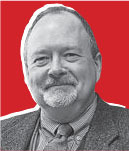From Jordan Peterson and Donald Trump
Jordan Peterson elicits a surprising amount of support from Christians in Canada these days. Despite his only rather tangential connection with the Christian religion, the University of Toronto professor is nonetheless championed by many Christians, including Evangelicals, particularly as a fearless tribune of free speech.
Peterson correctly understands we ought to protect freedom in general on first principle – no one’s freedom in any respect should be curtailed except for a good reason. God created us with liberty and responsibility. Freedoms don’t have to be argued for. Restrictions on freedom do.
Still, we don’t protect speech aimed at producing illicit violence, whether a crowded theatre stampede at the false alarm of "Fire!" or the persecution of a particular group in hate speech. We don’t allow the deceits of slander and libel, nor the whisperings of treason.
We also don’t allow speech that intrudes heavily upon the peace of others, whether amplified preachers in a public park or amped-up partiers in a quiet neighbourhood.
We nonetheless protect lots of speech we don’t like. Why? Partly because we believe in maximum freedom, all things considered. And partly because we want the widest, most creative and most challenging dialogue toward improving ideas and situations for the common good.
Christians increasingly feel marginalized in Canada today, seeing particularly our speech curtailed (or even simply absent) in the major cultural centres of journalism, jurisprudence, education, health care, politics, business, entertainment media and beyond. No wonder we like Professor Peterson making waves in several of those sectors.
Alas, however, Christian leaders keep crushing speech in our own precincts. A friend reports consulting with a church whose leaders were concerned about how to engage more new members and especially their young people. They suggested the problem was centred in troublesome folk among the new members who kept pressing to change things.
When he analyzed the church’s dynamics, my friend concluded the central problem was the refusal of charter families, people who helped start the church a few decades ago, to yield any real power. His conclusion was not welcome news to those leaders, representative as they were of those families. So they fired him.
To pick on my own tribe, I know of several professors at Christian schools who have, out of desperate loyalty to their institution, brought to the attention of their boards some sharp concerns about their administrators. Those administrators were eventually shown the door as the professors were correct in their judgments. But the shame the boards felt in admitting to their poor oversight of those administrators led to the dismissal also of the whistleblowers.
It is striking Jordan Peterson first came to public attention not because he argued with left-wing social justice warriors or right-wing trustees, but with his university administrators over university policies. (The same was true, of course, of Lindsay Shepherd, the teaching assistant censured for showing her class a Peterson debate video.)
Evangelicals therefore support someone who has militantly contended for freedom of speech against the very people who should have welcomed and defended it. Yet evangelical leaders themselves have a very mixed record of welcoming and defending diversity, let alone dissent.
Yes, some speech – in a family, church or Christian organization – can threaten the very fabric of that organization and must be repressed. But that should be the test: Is this speech posing a clear and present danger to the very life of the organization? Or is it merely embarrassing its leaders and implying changes should be made – which is very much not the same thing?
Indeed, only leaders with severe ego problems, unable to distinguish between their own good and the good of the organization, would see them as the same thing. They remind us of President Trump, who complained that protestors, such as those who disrupted the Senate hearings of Supreme Court nominee Brett Kavanaugh, should have been prevented from protesting, as he testified to his admiration for North Korean and Russian leaders who refuse to countenance, as they see it, such affronts to their dignity and authority.
Evangelicals may yet have more to learn, positively and negatively, from such current media darlings as Jordan Peterson … and Donald Trump.

John Stackhouse is professor of religious studies at Crandall University. Find more of these columns at www.FaithToday.ca/ChristAndCulture.